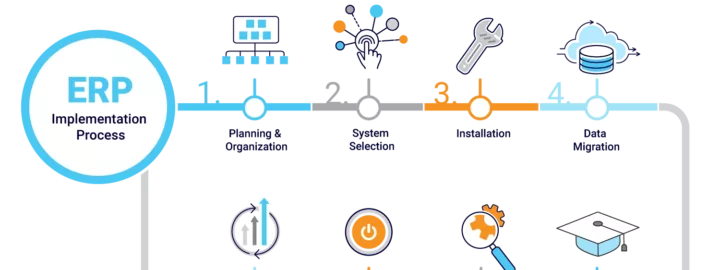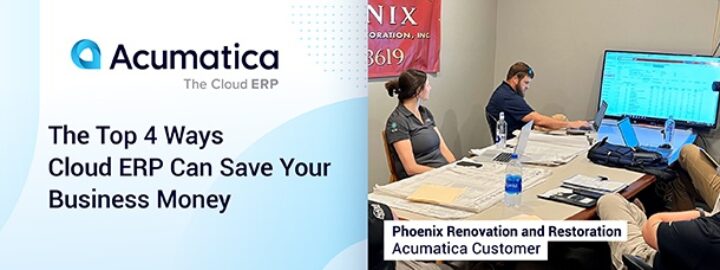Why is it important for every person to understand their company’s financial management information? And what role does the Modern CFO and his team play in that understanding? These are questions answered in today’s post, the third in our Modern CFO series. And we think it will be worth your while to read the first two on KPIs and reporting and planning for growth.
As automated tools have become increasingly more prevalent, the role of the Modern CFO and the accounting department has shifted. Accounting teams are spending more time on procedures and controls and less time looking for the missing $.01 on a bank reconciliation. There’s tremendous pressure to deliver information and financial reporting quickly as department leaders depend on accounting for timely, relevant information to make the kinds of quick decisions needed to survive in today’s world. Add to that the need for accountants to maintain system integrity, validate and synchronize data stored in disconnected systems, and manage version control over myriad spreadsheets, and you’re still looking at 12-hour days.
But does all this time and effort actually benefit the members of the organization that accountants serve? Are department leaders able to connect their goals and activities with the company’s financial results? Do they understand the information reflected on financial statements and how to influence the results reflected on them? They should and here’s why.

A new role for financial management teams
It’s the job of the Modern CFO and the accounting department to not only create and verify financial reporting and information but to make that validated information relevant and useful to the rest of the organization. The language of accounting can no longer be a foreign language spoken and understood only by accountants. It’s time for a shift in focus from the CFO level all the way through the accounting department.
Today’s accountants must learn how to translate financial management information in a way that it can be understood and applied by everyone in an organization. That means that today’s financial professionals must not only automate but educate and communicate if they are to be valued contributors to organizational success.
Automate
With the right ERP solution and financial management software, many traditional accountant chores are already being reduced or eliminated by automating many of their tasks, freeing accountants to spend more time on education and communication.
For example:
- Monthly bank reconciliations can be automated to keep transactions reconciled daily
- Artificial Intelligence can be applied to invoice scanning and entry tools, storing the original document electronically with the system transaction
- Automated workflows and approval limits for invoice approval can be set up within the application
- Pivot tables can be generated inside your accounting application, so managerial financial reporting data is timely and controlled
The first step in improving communication and education across an organization is to have a centralized, consistent view of the information.
Educate
As employees achieve career success and move up the organizational ladder, they are expected to understand and often interact with information. However, rarely are they provided with training in basic financial concepts, much less in specific financial management considerations that are relevant to their company. It’s impossible for these leaders to impact financial results they don’t understand.
Consider offering training opportunities for your team, such as:
-
- Creating a book club and inviting accounting staff and department leaders to read and discuss the information. Start with “Managing by the Numbers” by Chuck Kremer.
- Sharhttps://www.slideshare.net/ing this brihttps://www.slideshare.net/ef online slide presentation available on slideshare.net: “Understanding Financial Statements” with anyone who impacts financial results.
- Creating 1-hour training classes (in plain English) to explain concepts that impact financial results for management and staff. Include topics like:
- Revenue Recognition
- Expense Reporting
- Travel Expenses and Coding Under the New Tax Law
- Accrual Versus Cash Accounting
- When Is an Item an Expense, and When Is It an Asset?
- Inventory Costing Policies
Communicate
Accounting is a foreign language to most people in business. Few people can speak or understand the language of GAAP or generally accepted accounting principles: “Accrual versus Cash”, “Asset versus Expense”, or worse, what makes something a “Debit versus a Credit”. To maintain relevance in today’s organizations, it’s up to accountants and their leaders to shift their primary focus from back-office rule-following to front-office communication.
Rather than spending all their time creating, entering, and reconciling repetitive, routine transactions, today’s accountants need to be partners with department leaders in planning, analyzing, and interpreting results for better decision making.
This requires new skills and new tools, as well as the support financial management software, such as Acumatica cloud ERP provides, that can put relevant information at your fingertips in a controlled but structured way.
For example:
-
-
-
- Walk everyone in your company through either a sample cash flow statement (or from your organization, if you’re able)
- Work with department teams to help create visible measures—both leading and lagging—to help everyone understand the drivers of critical business results
- Show sales teams how they can use integrated CRM and accounting information to monitor credit holds and outstanding customer balances from their own customized screens.
-
-
Making an impact
As a Modern CFO or finance department leader, you’re fluent in the language of accounting. You know your way around a balance sheet and can create T accounts in your sleep. You can make sense of both Code section 179 and FASB 157. You can create financial statements that balance and offer advice on the potential impact of pending transactions of every sort.
You have exceptional skills and a lot on your plate, but with the help of the right automated system, you can eliminate some of the drudgery that keeps you from having an even greater impact on your organization. By taking the time to put yourself in the shoes of your non-accounting team members and helping them understand some of the information you create, you can help them improve the company’s financial results and take ownership of the transactions they control. The result is a true partnership between accounting and every other organizational department.
Get an overview of Acumatica Financial Management and our Reporting, Dashboards, and Data Analysis Toolkit. Contact our team with any questions about Acumatica’s cloud ERP software, financial management software, or to request a demonstration.
 Canada (English)
Canada (English)
 Colombia
Colombia
 Caribbean and Puerto Rico
Caribbean and Puerto Rico
 Ecuador
Ecuador
 India
India
 Indonesia
Indonesia
 Ireland
Ireland
 Malaysia
Malaysia
 Mexico
Mexico
 Panama
Panama
 Peru
Peru
 Philippines
Philippines
 Singapore
Singapore
 South Africa
South Africa
 Sri Lanka
Sri Lanka
 Thailand
Thailand
 United Kingdom
United Kingdom
 United States
United States














